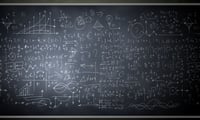 Mathematics is one subject that is commonly taught in many classical Christian schools just as it is in other American schools. By adopting Calculus for Everyone: Understanding the Mathematics of Change by Dr. Mitch Stokes, Trinitas will be demonstrating to our students the importance of mathematics in the broader western culture, and in particular, to philosophy. The marriage of math and science is obvious, but the study of philosophy also developed alongside math and science. The modern view of reality, of what is possible and impossible, is often shaped by science. This is abundantly clear in the Covid pandemic. We are bombarded with “look at the science” but the science seems to be shifting which leaves the public feeling (rightfully so) on shaky ground. Our biblical, Christian beliefs are also often attacked on the grounds of “science” so-called. Along with misuse of terms such as fact and truth, atheists often point to a perceived lack of scientific proof of God as the reason to reject His existence thus challenging fundamental Christian beliefs. Thus, we need more than science. We also need philosophy and theology, the queen of the sciences, to rightly place scientific facts into our worldview.
Mathematics is one subject that is commonly taught in many classical Christian schools just as it is in other American schools. By adopting Calculus for Everyone: Understanding the Mathematics of Change by Dr. Mitch Stokes, Trinitas will be demonstrating to our students the importance of mathematics in the broader western culture, and in particular, to philosophy. The marriage of math and science is obvious, but the study of philosophy also developed alongside math and science. The modern view of reality, of what is possible and impossible, is often shaped by science. This is abundantly clear in the Covid pandemic. We are bombarded with “look at the science” but the science seems to be shifting which leaves the public feeling (rightfully so) on shaky ground. Our biblical, Christian beliefs are also often attacked on the grounds of “science” so-called. Along with misuse of terms such as fact and truth, atheists often point to a perceived lack of scientific proof of God as the reason to reject His existence thus challenging fundamental Christian beliefs. Thus, we need more than science. We also need philosophy and theology, the queen of the sciences, to rightly place scientific facts into our worldview.
Giving our students an understanding of philosophy is a necessary foundation for classical education. In the future, we would like to teach a course (or two) on the philosophy of science (aka. Natural Philosophy) which would integrate the history of these disciplines. Since we do not currently have these philosophy classes in place, we are choosing instead to give our students a taste of this integration through our Calculus class.
This text teaches the main concepts of calculus: derivatives, integrals, limits, and the fundamental theorem of calculus using basic polynomials. By not delving into the increasingly complicated functions (rational, exponential, trigonometric, logarithmic) until after the “calculus” part has been mastered, it is a course accessible to all of our students coming out of precalculus. Our vision is that calculus not be considered an elective course reserved for only those college-bound students preparing for careers connected to math and science but instead that it be included in the standard senior class schedule.
As with all disciplines, there is a “grammar” of math. The language and symbology of math must be learned in order to understand its significance. Through the elementary years, our students have focused on the “doing” of math, drilling facts, learning symbols, being exposed to mathematical language. In the logic stage, our students have learned to manipulate numbers and variables in algebra and studied the importance of theorems and proofs in geometry. The years of math practice that these students have done equips them for calculus while also giving them an understanding of the place mathematics (along with science and philosophy) holds in the western tradition.


